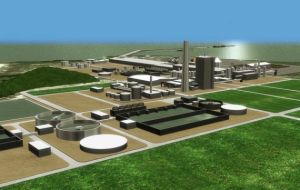MercoPress. South Atlantic News Agency
Uruguayan economy expands 3% in third quarter boosted by construction of pulp mill
 The Montes del Plata mill has demanded an investment of 2bn dollars, a significant sum for a GDP in the range of 48bn dollars
The Montes del Plata mill has demanded an investment of 2bn dollars, a significant sum for a GDP in the range of 48bn dollars Uruguay’s economy grew faster than economists expected in the third quarter, spurred by increased construction, transportation and communications activity. GDP expanded 3% from a year earlier, the central bank said on Thursday on its website. The economy grew 1.2 percent from the second quarter, the bank said.
Growth was led by transportation and communications, which expanded 7.1%, according to the central bank. Construction expanded 12%, mainly because of the building of a 2 billion dollars pulp mill in the west of the country. On the other hand, electricity, gas and water supply shrank 37.1% amid a drought.
“The year will end up as a year of low growth compared to the pace we were used to in recent years,” said Pablo Moya, an economist at research company Oikos.
The economy will expand 3.6% this year and 4% in 2013, according to the median estimate of 10 economists surveyed by the central bank in November. In 2011 the Uruguayan economy grew 5.7%, fuelled by rising domestic demand and increased exports.
Uruguay’s credit rating was raised to investment grade by Standard & Poor’s in April and by Moody’s Investors Service in July after the country reduced debt and diversified exports.
In September, the central bank increased its benchmark interest rate to 9% from 8.75%, saying “solid” domestic demand and rising global commodity prices convinced policy makers that inflation could quicken. Consumer prices rose 9.03% in November from a year earlier, the national statistics institute reported earlier this month.
The bank’s five-member policy committee will meet on Dec. 28 to decide whether to change the rate.
However despite the rosy growth figures, Uruguay faces a serious inflation problem, soaring costs and lack of qualified labour which is forcing costs even higher.
In a recent speech on the state of the economy from a local think-tank headed by economist Ernesto Talvi, who is also a World Bank and Brookings Institute consultant, he warned that the “management of the national budget and the incomes policy have fallen under the control of the trade unions and ideological allies”.
Talvi also underlined that with the high interest rate to try and contain domestic demand, the country has lost competitiveness with neighbouring Brazil and Argentina which have adopted a policy of easing interest rates.
Besides inflation, soaring costs, record interest rate, Uruguay also faces a serious shortage of power. With no oil and hydraulic capacity exhausted and lack of long term planning Uruguay in the last five years has had to support the government power and energy system with five billion dollars, while it does not dare increase public utility rates, already the dearest among Mercosur members.




Top Comments
Disclaimer & comment rules-

-

-

Read all commentsbeaten to a pulp,
Dec 14th, 2012 - 12:33 pm 0and still makes money,
sounds good to me,
can she beat CFK to a pulp,
or does plastic not count lol/
http://www.buenosairesherald.com/article/119350/us-moves-to-back-argentina
Dec 14th, 2012 - 04:47 pm 0www.argentina moves back to africa.com
Dec 14th, 2012 - 07:21 pm 0Commenting for this story is now closed.
If you have a Facebook account, become a fan and comment on our Facebook Page!